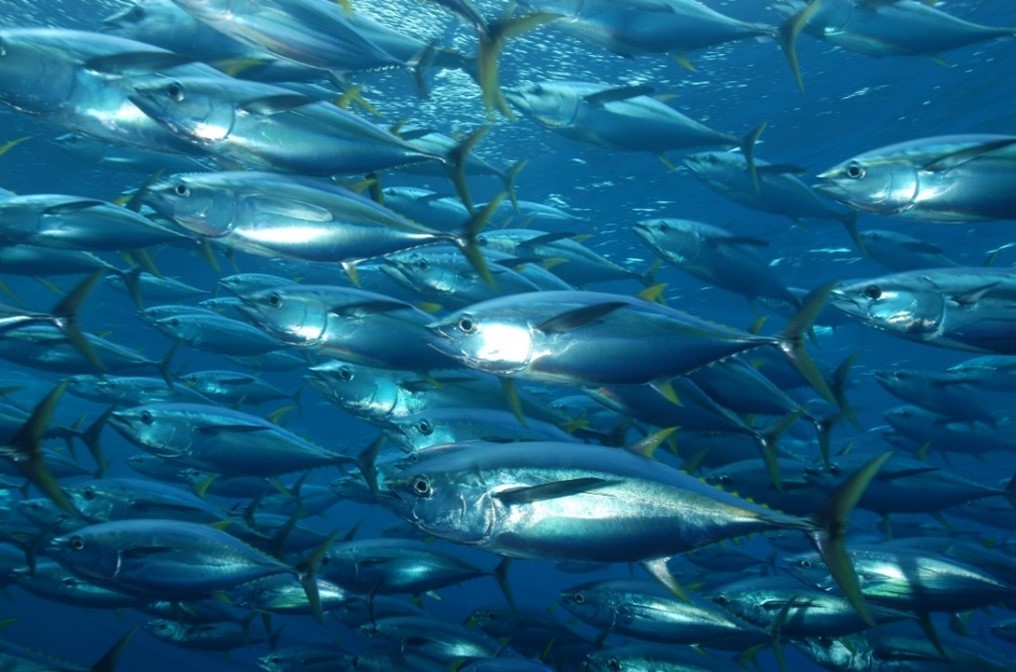Risks of conflicts between fishing and carbon sequestration in the ocean
An international team led by researchers from the University of Montpellier, the CNRS, and the University of California has mapped areas of potential conflict between two major contributions of the ocean to human societies: fishing and carbon sequestration. A few months ahead of thethird United Nations Ocean Conference, to be held in Nice in June 2025, their work, published in the journal One Earth, opens up original avenues for adapting fishing practices.
Fishing and carbon sequestration in the ocean: a long-neglected link
On land, the impact of agriculture on forests as carbon sinks is now well quantified. However, the link between fishing and carbon sequestration by the oceans remains less well understood. Through their carcasses and the carbon-rich feces they produce, which sink to the depths, fish contribute directly to carbon sequestration in the deep ocean. Ocean floors, meanwhile, store vast quantities of carbon accumulated over time in sediment, known as blue carbon. The problem is that fishing, by removing large quantities of fish and damaging the seabed through techniques such as bottom trawling (a method that involves dragging a trawl net that is in direct contact with the marine sediment), drastically limits the oceans' ability to trap this blue carbon.
While the conflict between blue carbon and the socioeconomic benefits of fishing (jobs, food security, etc.) has been highlighted for several years, the size and location of these potentially conflicting areas were unknown until now. This new study reveals that they cover 15% of the ocean, spread across international waters and coastal areas.

Fish play a crucial role in the ocean carbon cycle, contributing directly to carbon sequestration in the deep ocean through the regular production of carbon-rich fecal pellets and carcasses that sink into the abyss, trapping the carbon they contain for several centuries. © IRD – Ifremer
International waters, a major conflict zone
International waters, which are not under the direct authority of any state and where deep-sea fishing is practiced, account for nearly 50% of the conflict zones identified in this study. "However, other studies have shown that deep-sea fishing is recognized as contributing very little to global food security, as it is mainly carried out by developed countries with no food insecurity issues," the study's authors point out. "Our study therefore provides an additional argument for applying the precautionary principle, i.e., limiting deep-sea fishing until its impact on carbon sequestration has been assessed," they conclude.
Benthic trawling and carbon sequestration: a coastal conflict
While protecting the high seas will have little impact on overall socioeconomic objectives such as food security, the story is quite different when it comes to bottom trawling in coastal areas. Although the areas of conflict between carbon sequestration in sediment and bottom trawling cover only 3.8% of the ocean, more than 56% of bottom trawl catches occur there. "This shows that significant conflicts can arise when protecting these areas from trawling. These conflicts are all the more significant when the identified areas concern countries facing food insecurity," the researchers point out.
Solutions exist
However, the study shows that solutions do exist. "Let's take a simple example. The Argentine coastline is identified as conflictual because it is of paramount importance for carbon sequestration in sediment, but also for trawling. However, certain species can also be caught using gear that does not come into contact with the sediment. This is the case, for example, with Argentine hake, which is caught using bottom trawls that come into contact with the sediment, but which can also be caught using pelagic trawls or lines. "Changing fishing methods would therefore make it possible to maintain the jobs and socio-economic benefits derived from Argentine hake fishing, while preserving the carbon stock present in the sediment," the authors of the study explain.
Practical information
- Publication date: March 26, 2025
- Read the full article